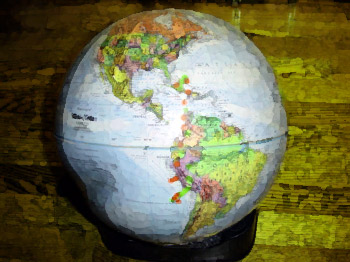|
In the Heat of SummerBy Marta Palos June I drop my brushes into turpentine and start thinking about supper when
Brian walks in with the globe of the planet. The size of a soccer ball,
the sphere is warped at the South Pole and Africa. Just found it at
the Goodwill store, he says, puts it on the kitchen table and sends
the creaking thing into a slow spin. "Look at these islands in the Aegean sea, Cora. I read somewhere
they're bathed in a special light. Ever wonder what Crete looks like?"
I pick up my sketchpad and pencil and start drawing him, bent over
his warped planet. "I don't think of faraway places. No money to
see them, so what's the point?" "The point is to improve your mind and your imagination. Books
serve the same purpose. It's too bad you don't like to read." He stops spinning the globe and asks if I wouldn't be proud of him
if he were a librarian. Or a professor of something. "Oh no. You'd be lecturing me all the time." "We could buy a house. How about living in your own house? Have
your own garden?" "All I need is a room." "Not quite true. You also need art supplies, and art supplies
are pretty expensive. In comparison, my books cost almost nothing. The
other day I bought a Webster and a dictionary of clichés for
three bucks at the used books store." This is something new. He's not in the habit of talking about money
matters, not at this length, at any rate. I put my pencil down. "What are you getting at, Brian?" "It's not what you think. It's about my measly high school education,
getting me nowhere. And since the transfer, they pay me even less. What
you don't realize is, I had to start here at the lowest level of the
mail carrier service." The move from Arizona to Colorado was my idea. I wanted to get away
from the proximity of the Hopi mesas I loved and feared at the same
time. My birthplace pulled me back, but I didn't want to go back. "I'll try to get more logo assignments," I say, though I
doubt I can. Work at the design studio I found in town is scarce. The drawing is not going well. I throw the page into the wastebasket,
and we spend the rest of the evening in a silence neither of us knows
how to break. While Cora paints, I drive the county roads. Here and there I have
a view of the Colorado Rockies peeking skyward from behind the foothills,
the crevices of Longs Peak still lined with the snows of last winter.
A postcard-perfect view, something Cora would never paint. In the morning I bundle up the day's mail in my cubicle, and around
ten set out for the delivery. In the eastern section the roads lead
through acres of corn, sugar beet, grazing pastures. Back toward west
a paved, winding road called Olympus runs through a hilly area, the
handful of houses built on large, woody lots. Glimpses from the road
reveal flagstone terraces, fireplace chimneys laid with natural stone.
The occupants I rarely see. One of them must be a writer, or maybe
a musician. Once I had a registered letter for him to sign, and I saw
books and papers strewn all over the place. He plays the piano like
a pro. Sometimes I linger at his mailbox and listen to the music pouring
forth from the open window. Once in a while the melancholic accords
suddenly switch to thunder, startling me into putting the jeep in gear
and leave. Though the properties on Olympus are more modest, the area reminds
me of Mission Hills in Kansas City, a few miles away from the district
of Raytown where I grew up. In the upscale neighborhood of Mission Hills
polished stone paths led to carved oak doors, no wheelbarrows stuffed
with petunias adorned the front yards, no plastic flamingos stood on
the flawless lawns. It was there I began to grasp the meaning of the
word distinguished. Money had to be part of the residents' refined taste,
but I figured that the sense for the finer things in life had to come
from many different sources, the way the Missouri River was fed by many
springs and creeks before it grew into something respectable to reckon
with. At the front door of my parents' house a plaster doe waxed to a shine
stood guard. I was eight or nine when my father brought the doe home.
He set it up, stepped back and said, "She sure makes a difference,
doesn't she?" |
